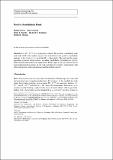| dc.contributor.author | Gouveia, João | |
| dc.contributor.author | Robinson, Richard Z. | |
| dc.contributor.author | Thomas, Rekha R. | |
| dc.contributor.author | Parrilo, Pablo A | |
| dc.contributor.author | Fawzi, Hamza | |
| dc.date.accessioned | 2017-02-04T00:01:08Z | |
| dc.date.available | 2017-02-04T00:01:08Z | |
| dc.date.issued | 2015-07 | |
| dc.date.submitted | 2015-04 | |
| dc.identifier.issn | 0025-5610 | |
| dc.identifier.issn | 1436-4646 | |
| dc.identifier.uri | http://hdl.handle.net/1721.1/106864 | |
| dc.description.abstract | Let M∈R[superscript p×q] be a nonnegative matrix. The positive semidefinite rank (psd rank) of M is the smallest integer k for which there exist positive semidefinite matrices A[subscript i],B[subscript j] of size k×k such that M[subscript ij]=trace(A[subscript i]B[subscript j]). The psd rank has many appealing geometric interpretations, including semidefinite representations of polyhedra and information-theoretic applications. In this paper we develop and survey the main mathematical properties of psd rank, including its geometry, relationships with other rank notions, and computational and algorithmic aspects. | en_US |
| dc.description.sponsorship | United States. Air Force Office of Scientific Research (AFOSR FA9550-11-1-0305) | en_US |
| dc.publisher | Springer Berlin Heidelberg | en_US |
| dc.relation.isversionof | http://dx.doi.org/10.1007/s10107-015-0922-1 | en_US |
| dc.rights | Creative Commons Attribution-Noncommercial-Share Alike | en_US |
| dc.rights.uri | http://creativecommons.org/licenses/by-nc-sa/4.0/ | en_US |
| dc.source | Springer Berlin Heidelberg | en_US |
| dc.title | Positive semidefinite rank | en_US |
| dc.type | Article | en_US |
| dc.identifier.citation | Fawzi, Hamza et al. “Positive Semidefinite Rank.” Mathematical Programming 153.1 (2015): 133–177. | en_US |
| dc.contributor.department | Massachusetts Institute of Technology. Department of Electrical Engineering and Computer Science | en_US |
| dc.contributor.department | Massachusetts Institute of Technology. Laboratory for Information and Decision Systems | en_US |
| dc.contributor.mitauthor | Parrilo, Pablo A | |
| dc.contributor.mitauthor | Fawzi, Hamza | |
| dc.relation.journal | Mathematical Programming | en_US |
| dc.eprint.version | Author's final manuscript | en_US |
| dc.type.uri | http://purl.org/eprint/type/JournalArticle | en_US |
| eprint.status | http://purl.org/eprint/status/PeerReviewed | en_US |
| dc.date.updated | 2016-05-23T12:11:12Z | |
| dc.language.rfc3066 | en | |
| dc.rights.holder | Springer-Verlag Berlin Heidelberg and Mathematical Optimization Society | |
| dspace.orderedauthors | Fawzi, Hamza; Gouveia, João; Parrilo, Pablo A.; Robinson, Richard Z.; Thomas, Rekha R. | en_US |
| dspace.embargo.terms | N | en |
| dc.identifier.orcid | https://orcid.org/0000-0003-1132-8477 | |
| dc.identifier.orcid | https://orcid.org/0000-0001-6026-4102 | |
| mit.license | OPEN_ACCESS_POLICY | en_US |
